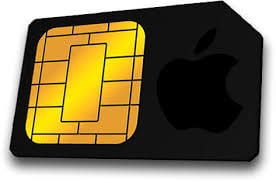Citing “sources close to Apple,” Business Insider reports that Apple is privately testing a U.S. mobile phone service, and is also in talks with European carriers to offer something similar. Back in 2011, Apple filed a patent regarding such a move. More on the patent in a moment.

According to Business Insider, here’s how the company’s mobile phone service would work: instead of paying your carrier every month, you would pay Apple directly for data, calls, and texts. Apple then provides you with everything you used to get from your carrier, but the Apple SIM switches between carriers to get the best service.
The services would be provided on an MVNO (Mobile Virtual Network Operator) basis. A MVNO is a mobile operator that doesn’t own its own spectrum and usually doesn’t have its own network infrastructure. Instead, MVNOs have business arrangements with traditional mobile operators to buy minutes of use for sale to their own customers.
In other words, Apple wouldn’t build/own the underlying infrastructure, but would obtain wholesale access from existing carriers. Business Insider notes that there’s no guarantee the services will go beyond the test phase, and that Apple “could take at least five years” to do a full launch.
The Seeking Alpha site says says that launching MVNOs would extend Apple’s control over the iPhone user experience to voice/data services, and allow it to experiment with new service plans/pricing. Of course, it could also trigger a backlash among carriers that find themselves competing with an Apple MVNO, and aren’t getting wholesale revenue. However, as Seeking Alpha notes, carriers would still have no other company to buy iPhones from.
This isn’t the first time that there’s been talk of an Apple MVNO. In 2012, veteran wireless industry strategist Whitey Bluestein said that has the distribution channels, digital content portfolio and customer base to make the move, and it also has more than 250 million credit cards on file for iTunes users who could be billed directly for wireless service.
Regarding the aforementioned patent (number #7,885,654), it’s for “dynamic carrier selection.” Apple’s concept is to buy minutes on any flavor of cell phone technology with multiple carriers and use a network controller system to mix and match service from any local participating network as needed when a user makes a call, texts or uses data.
The retail cell phone account would be held at Apple and cellular services charged to your iTunes account. The carriers would be made into dumb wireless data pipes that just sell bulk network time to Apple for resale to consumers. The carriers wouldn’t even know who is using their networks. The system might even use Wi-Fi and Apple’s Internet network, when available, instead of wireless cellular networks. Who cares what “pipe” you use, as long as the call goes through and sounds good?
The notion is that Apple could announce that it’s willing to purchase, say, 1,000,000 minute blocks of excess network time on any and all cellular networks. They would take the lowest bid per minute in every market. This is despite the natural reluctance of AT&T, Verizon, T-Mobile and Sprint to not be thrilled with the idea of Apple competing with them on their own networks.
And about that Apple SIM …. Apple and Samsung are reportedly working with global wireless carriers on a new “e-SIM” standard that would replace traditional SIM cards, and make it easier for customers to sign up for new data plans, according to The Financial Times.
Mobile providers currently included in the talks are said to include AT&T, T-Mobile US parent company Deutsche Telekom, Vodafone, Orange, Etisalat, Hutchison Whampoa, and Telefónica. The group working on the standard — the GSMA (Groupe Speciale Mobile Association) — hopes to see it debut in 2016.
Apple introduced its own Apple SIM (pictured) last year with the iPad Air 2. It allowed for carrier switching, but has only been supported by three U.S. and one UK carrier.
